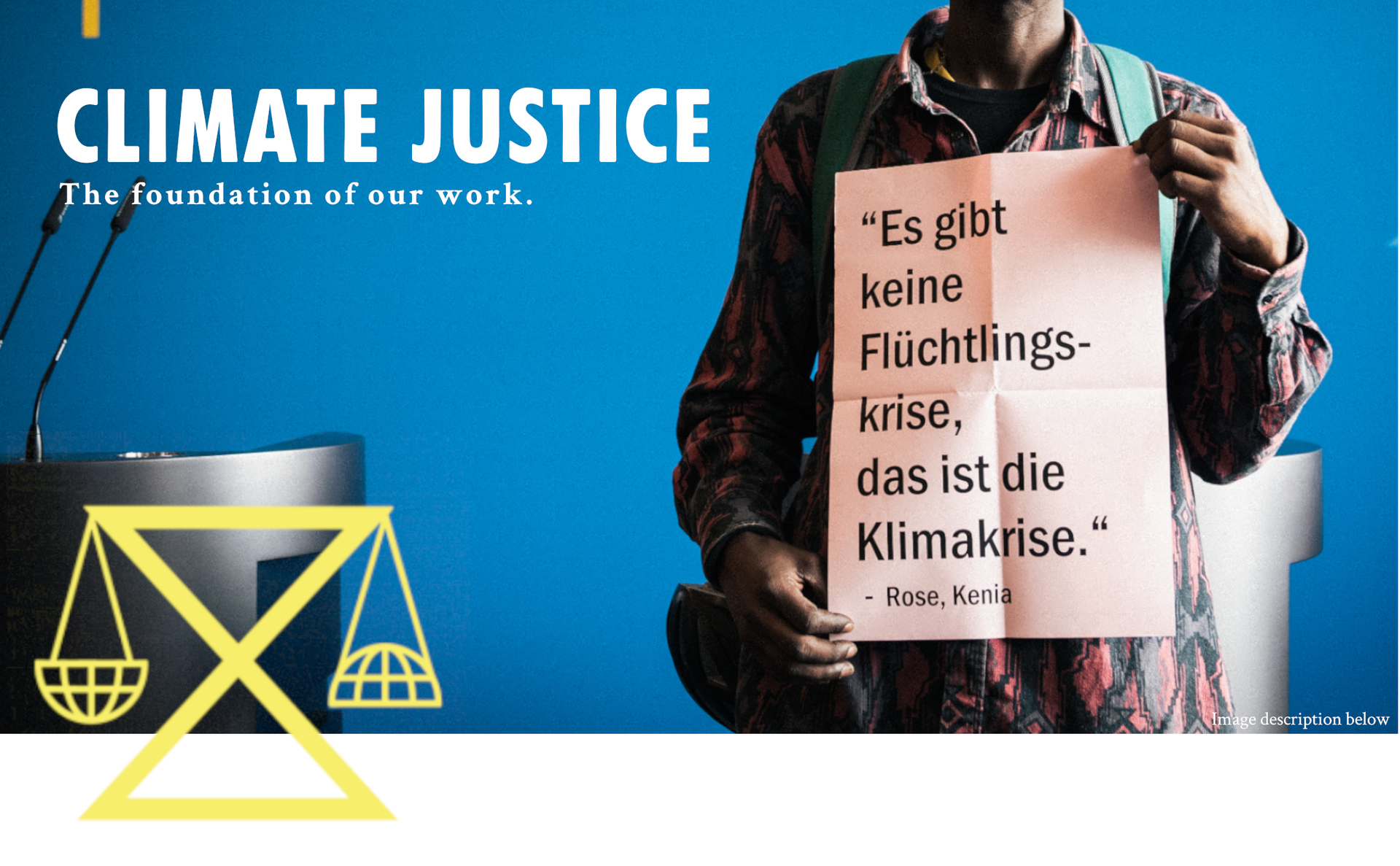
Climate justice is our foundation. This was not so clear from the outset. But learning and reflection are important to us. Since July 2024, the “Foundation of Climate Justice” has been an addition to our demands and values.
That is a reason to celebrate! We are grateful for all the feedback from within XR. And for the valuable objections from many people in the climate justice movement. We did not come up with the concept of climate justice. We are building on centuries of struggle by people in the Global South.
Read here the result of months of work and where we go from here.
Note: The words in italics with (number) after them are explained in more detail in the glossary below.
We center the voices and needs of those most affected by climate catastrophe, biodiversity catastrophe(0), and exploitation.
We give central importance to those who experience destruction and exploitation firsthand in their own lives and immediate surroundings (MAPA(1)). Climate catastrophe, species extinction, and exploitation are caused by human actions. Hence, we critically question our privileges and the societal system. We particularly listen attentively to those who suffer most under current systems of oppression(4). We are in the position to learn and support each other.
People in the so-called Global South(2), but also in the Global North(3), are losing their livelihoods and being oppressed. As a result, not everyone can adapt equally well to the consequences of the climate catastrophe.
The climate crisis will lead to more wars and conflicts. The climate crisis will worsen the health of many people. More and more people will be affected by disability. Young people and their descendants in particular will have to deal with the climate crisis for the rest of their lives. That is why these people must be the focus of debates and be heard. Preserving and building peace is essential to counter the climate crisis globally. Indigenous communities play an important role in the fight for climate justice. Their rights and their land must be protected. They should be able to free themselves from the system of oppression.
We recognize centuries of resistance to oppression and exploitation.
We approach this heritage with humility and respect. We acknowledge that the wealth of the Global North is based on colonial exploitation. The present system is based on the continuation of this exploitation (colonial continuities(5)). It continues to treat people with imperial(4) and racist violence, some of whom have been resisting for centuries. Therefore, we want to take up their perspectives and learn from their struggles. We actively organize exchange, cooperation and solidarity with MAPA.
We support these (local) resistances to dismantle (global) power structures.
Patriarchy and the capitalist idea of performance are currently shaping our world. People are discriminated against based on racist attributions, origin, class, gender, sexuality, body norms, among others (intersectionality(6)). The more of these forms of discrimination apply to people, the more vulnerable(7) they are and the more they are affected by the consequences of the climate catastrophe. To reduce this vulnerability, we reflect on our relationship with our fellow human beings and nature. We want to learn from each other and particularly focus on the knowledge of people who experience intersectional oppression. We want to connect with one another. We take responsibility for what arises from this.
We acknowledge past and present injustices and demand compensation.
The wealth of the Global North historically rests on the exploitation of the Global South and the emission of greenhouse gases. Our task is to end this environmental racism(8) and distribute goods and burdens equitably. A climate just world no longer relies on the exploitation of ecosystems and people. It is based on solidarity and joint cooperation. Those responsible for the climate catastrophe must join forces to act selflessly and come to terms with the injustice. Voluntary compensation payments (reparations(9)) are an essential first step towards climate justice.
Together we want to prevent present and future injustice.
Parts of the planet are becoming uninhabitable due to the climate catastrophe. People are already being forced to abandon their homes due to flooding, landslides and heat. Those most affected by this are the least responsible. The lifestyle of the Global North is based on economic growth and the profit of a few individuals. This exacerbates crises and wars around the world. We recognize flight and forced migration as an inevitable consequence of this. We are also committed to just border and asylum systems because they are part of climate justice.
On the path to climate justice, we act and think self-critically.
We critically question our shared responsibility, privileges and the social system.
We understand climate justice as a process that involves self-critical reflection and action. It requires individual action and local responsibility at a community level.
As initial steps toward a climate just society, we further demand:
- Tell the truth
- Act now! Every day counts!
- Beyond democracy!
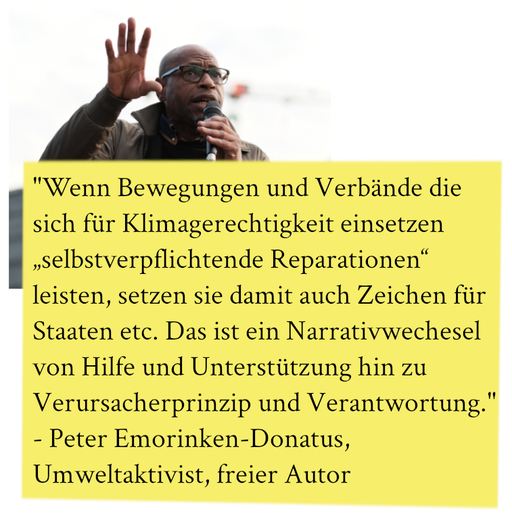
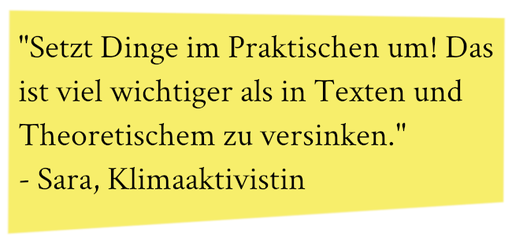
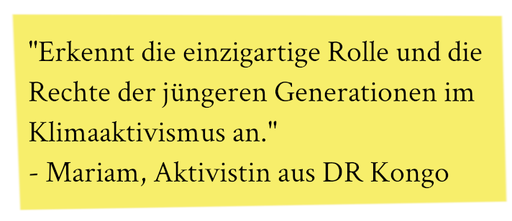
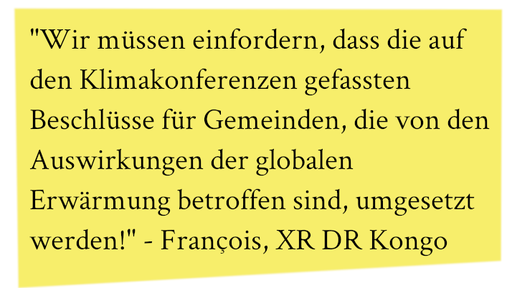
You can find the detailed feedback on the previous version of the Climate Justice Foundation here:
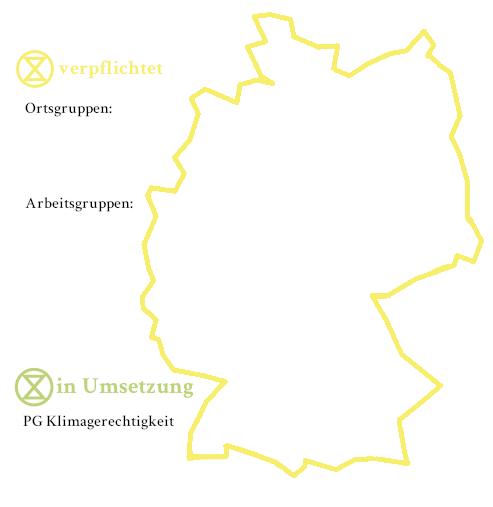
To ensure that climate justice does not just remain an empty shell, we make voluntary reparations. 20% of our incoming donations have been going to (XR-related) groups in the Global South since September 2024.
We invite all local and working groups to take a close look at the foundation formulated here. You can see which groups have committed themselves to this foundation on the map!
Are you active in a group yourself and interested in a workshop on climate justice? Get in touch here: forderung-klimagerechtigkeit@extinctionrebellion.de or via Telegram at t.me/jointherebellion
Material
Here you will find a collection of information with book recommendations and further material on climate justice.
Download the templates and print the basis on colorful paper (DIN A3) or order your own stickers! You will also soon be able to download flyers with the climate justice foundation here and print them out yourself.
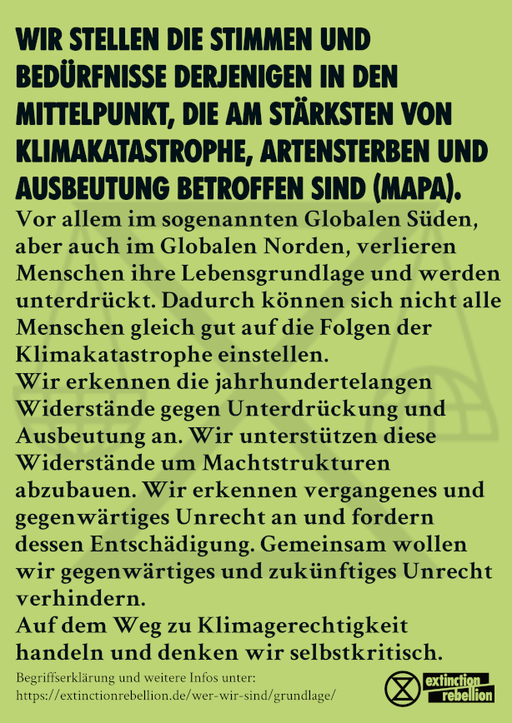
Glossar
Note on the Glossary: The sources used are listed under the respective descriptions. Examples and formulations have been added to the descriptions in some cases.
0 Climate and Biodiversity Catastrophe: The climate crisis due to global warming is only one part of the catastrophe. Ecosystems and biodiversity worldwide are also in crisis due to land grabbing, water, soil, and air pollution, overfishing, and deforestation. We are in the midst of the 6th great mass extinction. The cause of this is also the fossil-fueled patriarchal system. When we talk about the climate catastrophe, we also mean the biodiversity catastrophe. Similarly, when we speak of climate justice, we include justice in relation to the biodiversity catastrophe, as the causes and solutions share the same systemic roots.
1 MAPA: Stands for "Most Affected People and Areas". So people and regions most affected by different crisises. Sources: https://dbpedia.org/page/Most_Affected_People_and_Areas and https://fridaysforfuture.org/newsletter/edition-no-1-what-is-mapa-and-why-should-we-pay-attention-to-it/
2 / 3 so-called Global South / Global North: The term Global South describes regions of the world such as Africa, Southeast Asia, or Abya Yala (self-designation of South and Central America). These regions are, globally speaking, in a politically and economically disadvantaged position. This condition is due to the European colonial era and the associated exploitation, which originated from the Global North. The Global North includes countries such as France, Germany, or the USA. Countries of the Global North are in a privileged position of power. These countries are also often referred to as the "western world" or the "West." The division into South and North is understood independently of geographical location. For example, Australia is also considered part of the Global North (thus "so-called"). The term Global South aims to replace evaluative and externally determined expressions for the mentioned countries. Source: "Colonialism & Climate Crisis - Over 500 Years of Resistance," Shayli Kartal / Laura Bechert / Dodo (2021) https://www.bundjugend.de/wp-content/uploads/Kolonialismus_und_Klimakrise-ueber_500_Jahre_Widerstand.pdf(Page 32) and https://www.digital-global.net/glossar/
4 Current forms of domination
Forms of domination are instruments and mechanisms that exert power over people and nature. These mechanisms have formed over the past centuries and continue to influence our lives today. Current forms of rule include patriarchy, capitalism, imperialism, colonialism, or White Supremacy Culture.
Patriarchy: Patriarchy is an oppressive form of governance. In patriarchy, norms and rules are determined by men. It also involves a binary division into 'man' and 'woman,' which is also a construct. Patriarchy includes the historically entrenched favoritism of men over women. This domination and privilege are passed down through generations. This happens in all areas of life (education, leisure, family, ...). "Man" and "woman" are assigned an alleged role in society. This role primarily means being a wife and mother for women. For men, it means, for example, taking care of the family's financial security. Source: https://www.npla.de/lexikon/patriarchat/
Capitalism: Capitalism is an economic and social system. In capitalism, ownership is controlled by private individuals and not by the state. Economic growth and profits are the focus. This system is associated with the societal classification into classes. It is divided into working and owning classes. Systemic exploitation and oppression are also features of capitalism. In addition to classism, forms of oppression such as sexism or racism are components of the capitalist social system. Historically, colonialism was a basis for establishing the system. There can be no continuous economic growth in the face of the climate and biodiversity catastrophe. If planetary boundaries are not respected, human civilization will not survive in the long term. Source: https://www.rosalux.de/fileadmin/rls_uploads/pdfs/Themen/anticapitalismo.pdf
Imperialism: Imperialism is a practice of states to expand power and domination. A state takes over the land of another state or induces groups to submit to it. For example, a state controls political and economic areas of another state. Imperialism is always associated with exercising power. This can be military or economic power. Source: https://www.britannica.com/topic/imperialism
(European) colonialism
You have probably learned something about the so-called "discovery" of America by Christopher Columbus. While he is referred to as a "discoverer" in school, the reality is quite different. Christopher Columbus began the violent history of European colonialism in the 15th century. The occupation of other countries or regions by Europeans was accompanied by the expulsion, murder, and subjugation of the local population. In the 20th century, many European colonial rulerships were formally ended, and the colonized countries were officially politically independent. This independence was fought for by BIPOC after centuries of resistance against the colonizers. With imperialism, economic dependency continued in many places. Colonial dependencies and Eurocentric knowledge have not yet been overcome and are referred to as Colonial Continuities. Source: "Colonialism & Climate Crisis - Over 500 Years of Resistance," Shayli Kartal / Laura Bechert / Dodo (2021) https://www.bundjugend.de/wp-content/uploads/Kolonialismus_und_Klimakrise-ueber_500_Jahre_Widerstand.pdf (Pages 13,14); https://www.digital-global.net/glossar/#T and https://www.digital-global.net/glossar/
Racism & White Supremacy Culture:
Racism is a power relationship that privileges white people. Privileges are based on the discrimination of people not only in everyday life but also structurally through institutions. Colonial domination was legitimized by racism. This established a White Supremacy culture. White Supremacy is an oppressive ideology. The assumption is that whitepeople are superior to Black people, Indigenous peoples, or People of Color (PoC). Since colonial times, the expression of racism has changed because, for example, Black and Indigenous people and People of Color have resisted. However, there are still different forms of racism, such as against Black people or Muslims. Racism and White Supremacy are particularly evident, for example, in the police, authorities, or schools. Source: https://www.dismantlingracism.org/white-supremacy-culture.html; https://www.digital-global.net/glossar/#T and https://www.digital-global.net/glossar/
BIPOC is an abbreviation and stands for Black, Indigenous, and People of Color. The term originates from the US civil rights movement. It is an empowering and solidarity-based self-designation. Black is capitalized in every context to emphasize that it is neither an adjective nor a color. BIPOC connects:
- shared experiences of racism,
- exclusion from white-dominated mainstream society,
- collective attributions of "otherness".
It is about social commonalities and experiences. The term positions itself against racist external designations. Self-designation is an active, empowering, and critical action. It is thus an essential part of the resistance history against European colonialism and racism. In comparison to Black, white is always written in lowercase and sometimes in italics. Source: "Colonialism & Climate Crisis - Over 500 Years of Resistance," Shayli Kartal / Laura Bechert / Dodo (2021) https://www.bundjugend.de/wp-content/uploads/Kolonialismus_und_Klimakrise-ueber_500_Jahre_Widerstand.pdf (Page 14)
white does not refer to a color or skin color but is a political term. white marks the dominant and privileged position of people within the racist system. Within this system, being white is considered the societal norm. As a white person, you have privileges, unfair special rights, over BIPOC. This makes the racist power and oppression system visible. white is not an empowering self-designation. Therefore, white is written in lowercase and italics. Source: "Colonialism & Climate Crisis - Over 500 Years of Resistance," Shayli Kartal / Laura Bechert / Dodo (2021) https://www.bundjugend.de/wp-content/uploads/Kolonialismus_und_Klimakrise-ueber_500_Jahre_Widerstand.pdf(Page 14)
5 Colonial continuities: Colonial continuity means that colonial power structures are widespread. The centuries-old power dynamics continue steadily since the official end of colonial times. They lead to various forms and connections of oppression. The Global North continues to play the role of the oppressor, both in the past and today. Colonial continuities include, for example, companies from the Global North exploiting people and nature in the Global South. This happens when individuals or corporations illegitimately own land or when the World Bank forces countries in the Global South into debt dependence through its monetary policies. Two concrete examples: 1. The German company Wintershall-Dea, which extracts gas in Argentina. 2. Child labor in the Congo to mine cobalt for batteries, from which the Global North profits enourmously. Source: "Colonialism & Climate Crisis - Over 500 Years of Resistance," Shayli Kartal / Laura Bechert / Dodo (2021) https://www.bundjugend.de/wp-content/uploads/Kolonialismus_und_Klimakrise-ueber_500_Jahre_Widerstand.pdf (Page 31) and https://www.bundjugend.de/projekte/locals-united/kolonialismusundklimakrise/
6 Intersectionality: The word intersectionality contains the English word "intersection", which means "crossing". The term is attributed to the scientist and lawyer Kimberlé Crenshaw. It makes clear that many people are affected not only by one form of discrimination but by multiple forms simultaneously. Different forms of discrimination can have simultaneous effects. For example, people can be discriminated against multiple times based on their age, racist attributions, and gender identity. Various social inequalities and power relations play a role in the discrimination of people. Classism is a form of discrimination based on financial and economic disadvantage. Classism and racism can reinforce each other and thus have intersectional effects. Source: "Colonialism & Climate Crisis - Over 500 Years of Resistance," Shayli Kartal / Laura Bechert / Dodo (2021) https://www.bundjugend.de/wp-content/uploads/Kolonialismus_und_Klimakrise-ueber_500_Jahre_Widerstand.pdf (Page 22) and https://www.intersectionaljustice.org/what-is-intersectionality
7 Vulnerable: The term refers to the vulnerability of people, nature, or systems to crises. Strong vulnerability can greatly limit resilience. Vulnerable people and nature may have less ability to protect themselves against crises. Source: https://www.undrr.org/terminology/vulnerability
8 Environmental racism: Environmental racism means the outsourcing of environmental damages to non-whitecommunities. The term environmental racism has its roots in the late US civil rights movement. In 1982, toxic waste was slated to be stored in a predominantly Black neighborhood in North Carolina. This sparked massive resistance from local communities, primarily led by Black, Indigenous, and People of Color (BIPOC). It marked the beginning of the environmental justice movement. Source: "Colonialism & Climate Crisis - Over 500 Years of Resistance," Shayli Kartal / Laura Bechert / Dodo (2021) https://www.bundjugend.de/wp-content/uploads/Kolonialismus_und_Klimakrise-ueber_500_Jahre_Widerstand.pdf (Page 47) and https://www.nf-farn.de/umweltrassismus-klimagerechtigkeit-koloniale-kontinuitaeten-klimakrise#Bullard
9 Reparations: Reparations are a form of compensation. For example: Africa has hardly contributed to the climate crisis, while Europe has contributed a great deal. Europe should therefore pay for the climate damage. This requires recognition of the climate debt. Compensation and restitution of the numerous financial, social and ecological debts of the countries of the Global North to those of the Global South is also needed. These debts were incurred during the colonial past and through the neo-colonial dynamics of today (Oumarou Mfochivé). "Loss and damage" are irreversible damages caused by the climate crisis that occur despite adaptation efforts. Against the resistance of several countries in the Global North, the concept of loss and damage was enshrined in the Paris Agreement in 2015. Sources: Oumarou Mfochivé, "Klimaschulden & Reparationen" (German) https://konzeptwerk-neue-oekonomie.org/wp-content/uploads/2024/04/Klimaschulden-und-Reperationen_Oumarou-Mfochive.pdf, UNEP: https://www.unep.org/topics/climate-action/loss-and-damage/about-loss-and-damage
Description of the cover picture: The photo was taken during a joint action by XR Berlin with BIPoC for Future, Seebrücke Berlin, O-Platz lebt, Bleiberecht für alle, Flüchtlingsrat, International Women Space, Letzte Generation and others. During the open day at the Ministry of the Interior, activists from these groups held a rally in front of the entrance under the slogan “Open Doors, Open Borders!” They drew attention to the links between the climate crisis and forced migration. At the same time, people in the ministry showed up with quotes from people on the move. They carried their voices to where they are too often ignored.
The person in the picture is not organized with XR.